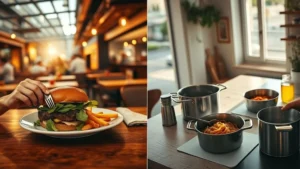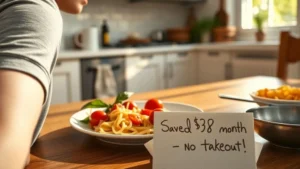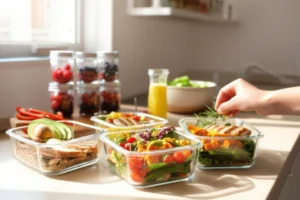Okay, real talk? Those random restaurant runs, quick pickups, or scrolling on food apps after a hectic day… they seem so small. Like, what’s $15 here or $20 there? But if you take a step back and add it all up? It’s a sneaky little money leak that’s draining both your wallet and your wellness. I’ve definitely been there—thinking I’m just treating myself, but really I’m just throwing away cash and eating more calories than I need. Spoiler alert: skipping eating out can seriously flip your budget and health for the better. So, want to hear why? Let’s dive into the real benefits of not eating out—no boring lectures, just practical and doable stuff.
Costs Add Up
Have You Calculated Your Real Food Spend?
Here’s a little brain teaser for you: the average home-cooked meal costs about $4, but that quick meal out? Around $20. Sounds like a big jump, right? Let’s actually break that down and see what’s going on.
| Meal Type | Average Cost |
|---|---|
| Home-Cooked Meal | $4 |
| Eating Out / Takeout Meal | $20 |
Imagine if you eat out twice a week vs. cooking those same meals at home. Over a month, you’re looking at anywhere from $120 to $320 extra spent just on food. No wonder that emergency fund you’re building feels so slow to grow!
One friend shared how she saved over $300 in just five weeks by cooking her own meals. That cash? She funneled it into a little vacation fund and felt way less stressed about money. If you’re wondering, no eating out for a month can be a game-changer, especially if you normally grab lunch or dinner out without thinking twice.
Are Home Meals Less Exciting?
Honestly, I used to think so. But here’s the thing… cooking at home is a lot more fun than you think once you get the hang of it. You can personalize meals, try new flavors, and even impress your friends with a dish or two. (Yep, that naan bread pizza night at my place? Total hit.)
Plus, accelerating your cooking skills doesn’t mean living a bland life. One woman’s story about quitting eating out for 30 days showed how she started hosting potlucks and game nights. Food became about connection, not just convenience. Wondering if it works? Check out is eating out a waste of money for more on how shifting your habits can boost more than just your budget.
Health Benefits Hit Home
Why Are Restaurant Portions Sneaky?
Have you ever noticed how restaurant meals somehow seem bigger, heavier, and stick with you longer than meals you cook? Turns out, restaurants load up on salt, fats, and sugar to make things taste good — but that’s not doing your body any favors.
Cooking at home puts you in the driver’s seat. You pick the ingredients, control how much salt or oil goes into your meal, and naturally, it becomes healthier. For example, a veggie stir-fry you whip up in 15 minutes might be just 400 calories with fresh ingredients, whereas the takeout version can easily double that with hidden fats and sodium.
There’s solid research backing this up. People who regularly eat home-cooked meals tend to have better diets overall — more fruits and veggies, less processed junk — and even better sleep patterns. Saving money, gaining energy, and feeling better? That sounds like a solid deal. This all ties into why do you really save money not eating out because of health reasons, too. It’s not all about dollars.
Could Cooking At Home Change Your Energy?
Yep, it really can. When you take control of cooking, you’re often eating fresher food, not inhaling additives or preservatives, and that makes a big difference. So many people report feeling lighter and more energized, especially after ditching their daily takeout habit. It might sound too simple, but sometimes the smallest changes pack the biggest punch.
Saving More Than You Think
How Much Can You Save?
The real number depends on your current habits. If you only eat out once a week, your savings might be smaller, like $50–$150 a month for a family, which is still meaningful. But if you usually swipe your card at restaurants 4–5 times a week, stopping or cutting back can save you hundreds, if not thousands, every year.
I tried a 30-day no eating out challenge recently. I was shocked to see my food spending drop by about $225! Can you imagine what that adds up to in a year? And it wasn’t about deprivation—just a bit of planning and rediscovering favorite recipes. You can find tips on how to stop eating out and save money that make this feel doable rather than daunting.
Is It Really Worth the Effort?
Think of cutting back on eating out like building a muscle. It’s tough at first, but once you develop a few go-to meals and grocery habits, it gets easier and even kinda fun. Plus, the money saved can help pay down debt, grow your savings, or fund something exciting, like a vacation or hobby.
One clever tip from a Reddit thread I loved was having a couple of frozen staples (think chicken fingers, pierogis) ready in the freezer for when quick meals are needed. It’s a way to keep things simple without falling back into convenience eating or takeout.
Make Kitchen Time Fun
Copy Your Favorites
Missing Chipotle’s burrito bowls or your favorite pizza? There are so many “copycat” recipes online that get you close to the original taste but at a fraction of the cost. For example, the website Serious Eats has killer pizza dough recipes that you can prep ahead—and trust me, homemade pizza night is a blast.
Food doesn’t have to be complicated to be delicious. A fusion of flavors, like a burrito wrapped in homemade flatbread, can spice things up without breaking the bank. Plus, mastering even one dish feels like a little victory, and soon friends might be knocking on your door wanting to hang out—and eat!
Don’t Sweat Occasional Treats
Look, I’m not saying never ever eat out again. Life happens. There are times when you just want that treat or have a social event. The trick is balance. Some folks find it easier to cut back rather than going cold turkey, allowing a couple of restaurant meals a week without guilt. That way, when you do eat out, it feels like a real treat instead of a routine.
This kind of approach is backed by lots of success stories. So go easy on yourself—it’s about building habits, not restrictions. Also, if you want to learn more tips on balancing kitchen life and dining out, check out is eating out a waste of money for ideas.
Wrapping It Up
Here’s the bottom line: the benefits of not eating out go way beyond just saving a few bucks. When you cook at home, you gain control—over your budget, your health, and even your social life. Sure, it might feel tricky at first, but once you get into the rhythm with a few simple recipes and a little planning, it can feel downright empowering.
By cutting back on takeout, you’re not just keeping more money in your pocket (think hundreds every month!). You’re also feeding your body better, feeling more energetic, and maybe even discovering new ways to enjoy food and time with friends. So why not pick one week this month to try cooking at home more? Track your spending and your mood. You might just fall in love with the process (and your savings account will thank you!).
And hey, if you want some extra motivation, challenge yourself to no eating out for a month —or at least get started with a week. You’ll learn tricks, new recipes, and probably save way more than you think. Curious to know do you really save money not eating out because of all this? The answer’s a big yes.
Ready to give it a try? I’d love to hear your stories or struggles—because trust me, I’ve been there too. Let’s make saving money and eating well something we actually enjoy together.













